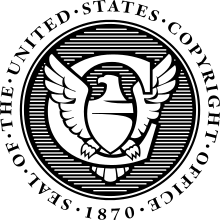Compendium of U.S. Copyright Office Practices
The Compendium of U.S. Copyright Office Practices is a manual produced by the United States Copyright Office. It is intended to be used primarily by the Copyright Office staff, as a general guide to the Copyright Office policies and procedures such as registration, deposit and recordation.[1]
The Compendium is directed to policy under the 1976 Copyright Act, as amended. The Compendium is now in its third edition, replacing the earlier "Compendium II", which in turn replaced the original Compendium that described policy under the earlier 1909 Copyright Act.
The Compendium is an internal manual, and it does not have the force of law, unlike the U.S. Copyright Act or Copyright Office regulations.[2] However, some courts have cited to it as persuasive authority and given it deference based on the Copyright Office's specialized experience and broader investigations and information about copyright law.[2] For some issues that are not addressed in the statute or regulations (such as, for example, whether to issue a registration to a government body claiming a copyright in its enacted laws), the Compendium is the only on-point authority.
The Compendium is sometimes, but not often, used by attorneys in dealings with the Copyright Office. A Westlaw search of the FIP-CS database which contains documents from the U.S. Supreme Court, Courts of Appeals, District Courts, Bankruptcy Courts, Court of Federal Claims, U.S. Tax Court, Military Courts, and related federal and territorial courts showed fewer than fifty citations of the Compendium by the courts total.[3] This is in contrast to, for example, the Manual of Patent Examining Procedure, which is heavily relied upon by attorneys and agents dealing with the patent functions of the United States Patent and Trademark Office.
A public draft of the third edition of the Compendium was released by the Copyright Office on August 19, 2014.[4] The official version, entitled Compendium of U.S. Copyright Office Practices, Third Edition, was released on December 22, 2014.[5] Proposed revisions to the Compendium were published on June 1, 2017;[6] After a comment period, a revised version of the Compendium was published on September 29.[7]
As of August 2018, the September 2017 release is the most current.[8] It includes changes taking the Star Athletica, LLC v. Varsity Brands, Inc. decision into account.[9]
References
- Goldstein, Paul. Goldstein on Copyright. Aspen Publishers Online. p. 3-172. ISBN 9780735544857.
- Compendium of U.S. Copyright Office Practices, Third Edition, Introduction, p. 2. "The Compendium does not override any existing statute or regulation. The policies and practices set forth in the Compendium do not in themselves have the force and effect of law and are not binding upon the Register of Copyrights or U.S. Copyright Office staff."
- Compendium II: Copyright Office Practices, Patents, Copyrights, Trademarks, Trade Secrets - Pierce Law Center
- "U.S. Copyright Office Releases Public Draft of New Compendium of Copyright Office Practices". U.S. Copyright Office. August 19, 2014. Retrieved August 19, 2014.
- "U.S. Copyright Office Releases the Compendium of U.S. Copyright Office Practices, Third Edition". NewsNet (564). United States Copyright Office. December 22, 2014. Retrieved December 22, 2014.
- "Copyright Office Releases an Updated Draft of the Compendium of U.S. Copyright Office Practices, Third Edition". Copyright Office NewsNet (666). U.S. Copyright Office. June 1, 2017. Retrieved August 17, 2018.
- "U.S. Copyright Office Releases Updated Version of the Compendium of U.S. Copyright Office Practices, Third Edition". Copyright Office NewsNet (684). U.S. Copyright Office. September 29, 2017. Retrieved August 17, 2018.
- "Compendium Revision History". U.S. Copyright Office. Retrieved August 17, 2018.
- Fiscal 2017 Annual Report (PDF) (Report). United States Copyright Office. p. 12.
External links
- Official copies of the Compendia, hosted by the U.S. Copyright Office
- Compendium of U.S. Copyright Office Practices, Third Edition (official version, December 22, 2014)
- Compendium of Copyright Office Practices (Compendium II) (official version, 1984)(superseded)
- Compendium of Copyright Office Practices (Compendium I) (official version, as of July 1, 1973)(superseded)
- Unofficial archives of the Compendia
- An online copy of the superseded Compendium II, at the IP Mall (operated by Franklin Pierce Law Center).
- Another copy of superseded Compendium II
- An online copy of the superseded Compendium I (July 1973), at the IP Mall.
